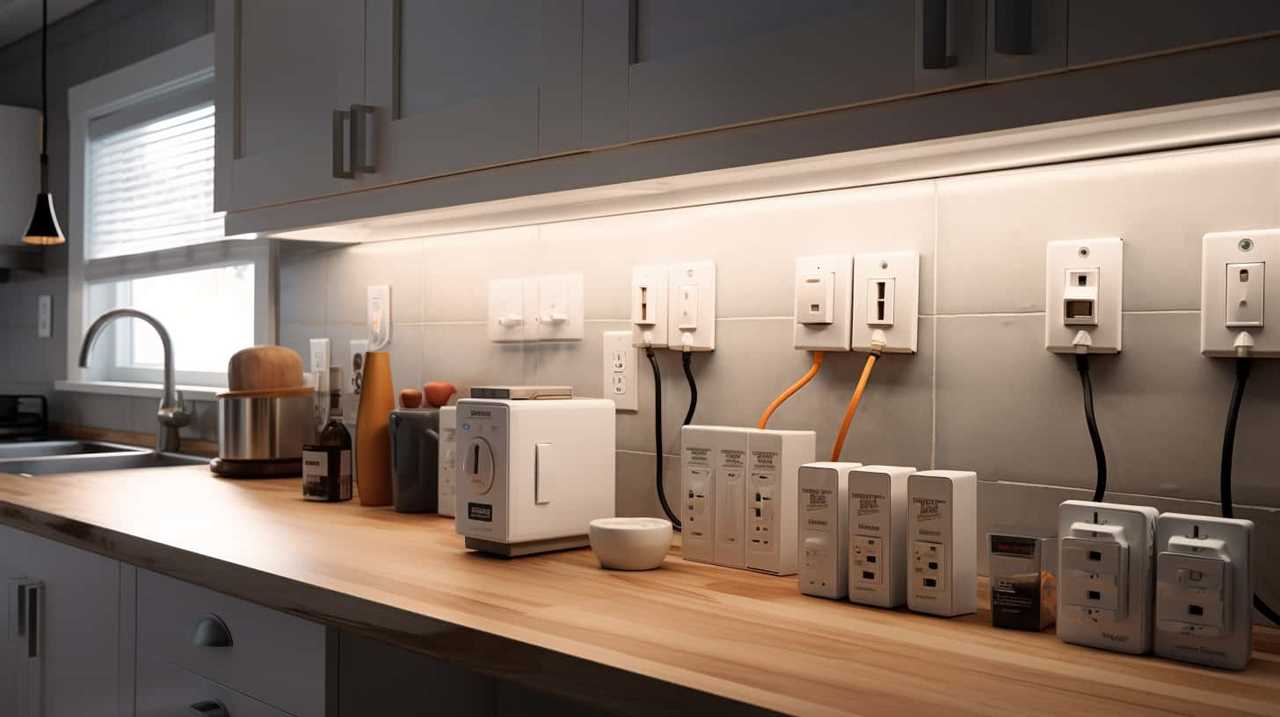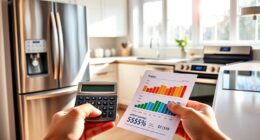Have you ever stopped to think about which appliances in our homes consume the most electricity by listening to their hum?
In this article, we’ll delve into the world of power-hungry home appliances.
From refrigerators that store our food to air conditioners that keep us cool, we’ll uncover the top energy-guzzlers in our households.
So, if you’re eager to master your energy consumption and save some cash, buckle up as we take you on a journey through the realm of electricity-hungry machines.

Key Takeaways
- Refrigerators and air conditioners account for a significant portion of household electricity consumption, with refrigerators alone contributing about 13%.
- Energy-efficient refrigerators, with features such as advanced insulation and smart temperature controls, can save money and reduce greenhouse gas emissions while maintaining consistent temperatures and extending the shelf life of perishable items.
- Clothes dryers and water heaters also consume a significant amount of electricity, but using energy-efficient drying methods and opting for ENERGY STAR certified water heaters can help minimize energy consumption and save money on utility bills.
- Electric stoves are major energy-consuming appliances, and choosing energy-saving alternatives such as induction cooktops can reduce energy waste, provide faster and more precise cooking, and be safer and easier to clean.
Refrigerators
Refrigerators account for approximately 13% of our household electricity consumption. When it comes to energy efficiency, choosing the right refrigerator can make a significant impact on both your energy bills and the environment.
Energy efficient refrigerators are designed to use less electricity while still providing optimal food preservation. These refrigerators typically feature advanced insulation, improved compressors, and smart temperature controls. By reducing energy consumption, energy efficient refrigerators not only save you money but also help to reduce greenhouse gas emissions.
Additionally, they have a positive impact on food preservation by maintaining consistent temperatures and humidity levels, which helps to extend the shelf life of perishable items.
When shopping for a new refrigerator, look for the Energy Star label to ensure that you’re choosing an energy efficient option.

Air Conditioners
Now let’s move on to air conditioners, which play a significant role in our household electricity consumption. When it comes to energy saving tips for air conditioners, there are several strategies that can help reduce electricity usage:
- Set the thermostat at an optimal temperature, ideally between 24-26 degrees Celsius, to balance comfort and energy efficiency.
- Use ceiling fans in conjunction with the air conditioner to improve airflow and distribute cool air more effectively.
- Keep doors and windows closed while the air conditioner is running to prevent cool air from escaping and warm air from entering.
Regular maintenance of air conditioners also offers several benefits:
- Regularly clean or replace air filters to ensure proper airflow and efficient cooling.
- Schedule professional maintenance at least once a year to inspect and clean the unit, check refrigerant levels, and address any potential issues.
- Clear debris from the outdoor unit and ensure proper ventilation for optimal performance.
Following these energy saving tips and performing regular maintenance can help maximize the efficiency and lifespan of your air conditioner while minimizing electricity consumption.
Clothes Dryers
Clothes dryers consume a significant amount of electricity in our households. To minimize their energy usage, it’s important to adopt energy efficient drying methods.
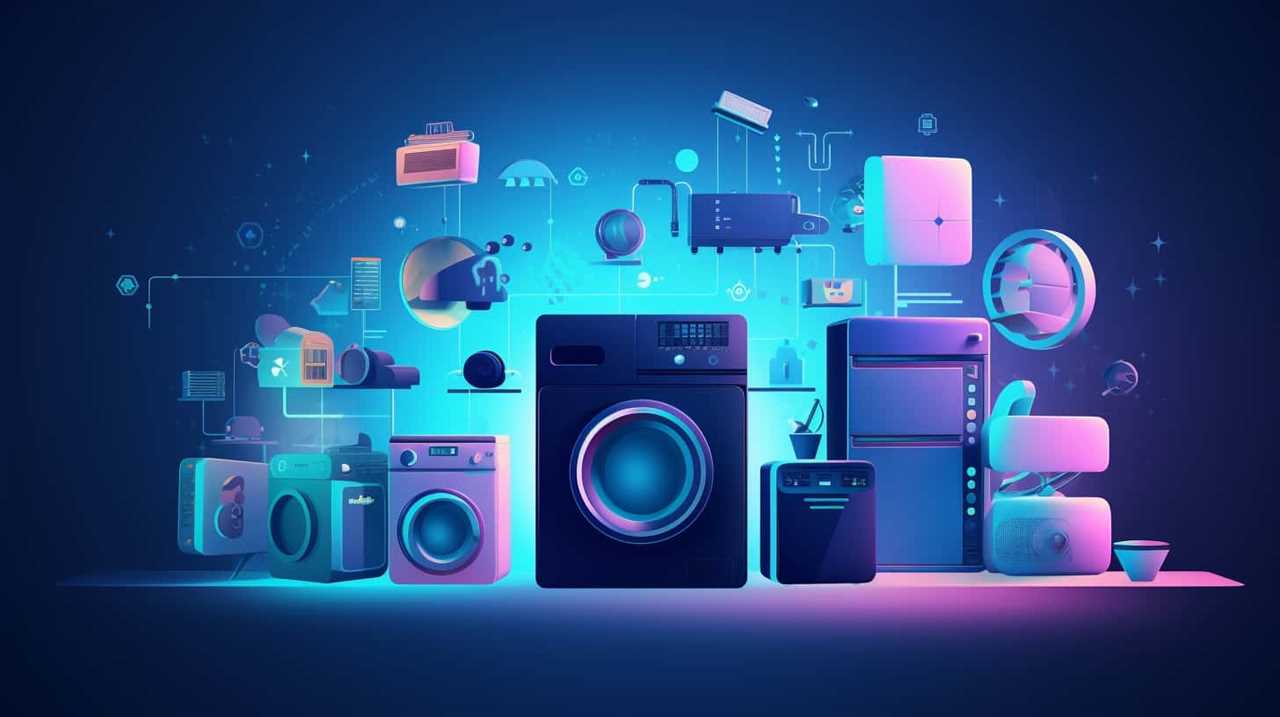
One effective method is to use a moisture sensor in the dryer, which automatically shuts off the machine once the clothes are dry. This prevents unnecessary energy consumption.
Another energy saving technique is to air dry clothes whenever possible. Not only does this reduce electricity usage, but it also has a positive impact on clothing lifespan. Tumble drying can cause wear and tear on fabrics, leading to shorter lifespan.
Water Heaters
To continue our exploration of energy-consuming appliances, let’s now turn our attention to water heaters. When it comes to reducing water heater energy consumption, there are a few key points to consider:
- Opt for energy efficient water heaters: Look for models that are ENERGY STAR certified, as they’re designed to be more energy efficient and can save you money on your utility bills.
- Insulate your water heater: Adding insulation to your water heater can help reduce heat loss and improve its energy efficiency.
- Lower the temperature: Lowering the temperature setting on your water heater can also help save energy. Consider setting it to 120 degrees Fahrenheit, which is hot enough for most household needs while still being energy efficient.
Electric Stoves
Electric stoves are one of the major energy-consuming appliances in our homes. In comparison to other appliances, electric stoves can have a significant impact on our electricity bills.

However, there are energy-saving stove alternatives available that can help reduce our energy consumption and save money in the long run.
Energy Consumption Comparison
We compared the energy consumption of different home appliances, and electric stoves stood out as one of the highest consumers. When analyzing energy usage, it’s essential to consider factors such as standby power consumption and the use of energy-efficient lighting.
Here is a comparison of the energy consumption of electric stoves:
- Standby power consumption: Electric stoves typically have a low standby power consumption. When not in use, they consume minimal power, making them more energy-efficient compared to other appliances.
- Energy-efficient lighting: Some electric stoves come equipped with energy-efficient lighting features. These lights use less electricity and can contribute to reducing overall energy consumption.
Energy-Saving Stove Alternatives
One alternative to electric stoves that can help save energy is by using induction cooktops. Induction cooktops are energy efficient cooking methods that use electromagnetic fields to heat the cookware directly. Unlike traditional electric stoves, induction cooktops only heat the pot or pan, rather than the entire cooking surface. This targeted heating reduces energy waste and allows for faster and more precise cooking.

Induction cooktops also have the advantage of being safer, as they don’t generate heat directly and cool down quickly after use. Additionally, they’re easy to clean and maintain.
Dishwashers
Our household dishwashers consume a significant amount of electricity. To reduce energy consumption and save on electricity bills, consider investing in energy-efficient dishwashers. These appliances are designed to use less water and electricity while still providing excellent cleaning performance.
Here are some dishwasher maintenance tips to maximize energy efficiency:
- Load the dishwasher efficiently: Arrange dishes properly to ensure maximum capacity and avoid rewashing.
- Use the dishwasher’s eco cycle: This cycle uses less water and lower temperatures, reducing energy consumption.
- Clean the dishwasher regularly: Remove food debris from the filter and spray arms to maintain optimal performance.
Washing Machines
When it comes to washing machines, there are a few key points to consider.

First, energy-efficient washing machines can greatly reduce electricity consumption compared to older models. This can lead to significant savings on electricity bills over time.
Additionally, it’s worth exploring alternative methods of washing clothes, such as handwashing or using a laundromat, which may be more energy-efficient for certain individuals or households.
Energy-Efficient Washing Machines
In terms of energy consumption, washing machines are among the home appliances that use the most electricity. When it comes to energy-efficient washing machines, there are several brands that stand out in the market. Companies like LG, Samsung, and Bosch offer a range of models that are designed to minimize energy usage while still providing effective cleaning performance.
To further reduce energy consumption, here are some tips to consider:

- Wash full loads: Running the washing machine with a full load maximizes its efficiency.
- Use cold water: Heating water accounts for a significant portion of energy usage, so opting for cold water whenever possible can save energy.
- Choose shorter wash cycles: Many modern washing machines offer shorter cycles that still provide thorough cleaning.
Impact on Electricity Bills
We can see a significant impact on our electricity bills when using washing machines, especially if they aren’t energy-efficient. Washing machines consume a considerable amount of electricity, and this can have a direct effect on our monthly expenses.
To minimize the impact on our bills, it’s essential to choose energy-efficient washing machines that are designed to use less energy while still providing effective cleaning. Additionally, there are energy-saving tips that can help reduce the electricity consumption of washing machines.
These include washing full loads, using cold water whenever possible, and utilizing shorter wash cycles. By adopting these energy-saving practices, we can lower our electricity bills and contribute to a more sustainable and cost-effective household.
Alternatives to Washing Machines
To explore alternatives to washing machines, let’s consider other home appliances that can effectively clean our clothes while consuming less electricity. Here are three energy-efficient laundry solutions that can be used as alternatives to traditional washing machines:
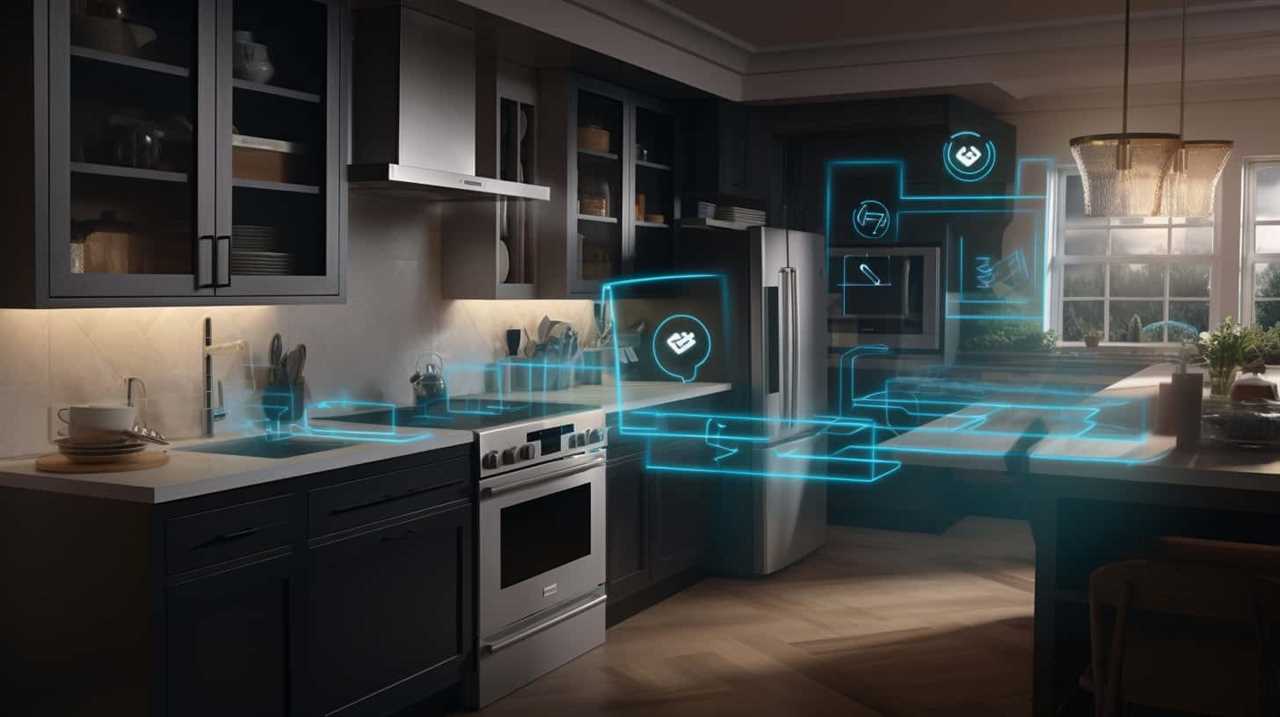
- Portable Washing Machines: These compact devices offer a smaller capacity but use less water and electricity compared to full-sized washing machines. They’re ideal for small living spaces or as a supplementary washing option.
- Hand Washing: Although it requires more physical effort, hand washing is a low-energy alternative that can be effective for smaller loads. By using eco-friendly detergents and cold water, you can minimize energy consumption while still achieving clean clothes.
- Laundry Services: Utilizing laundry services can be an excellent alternative to washing machines, especially for individuals or families with busy schedules. These services often use industrial-grade, energy-efficient machines that can handle large loads efficiently.
Freezers
Freezers consume a significant amount of electricity in our homes. When it comes to energy consumption, the size of the freezer plays a crucial role. Larger freezers tend to consume more energy as they require more power to maintain the low temperatures throughout the entire space.
However, there are energy-saving freezer options available in the market that can help reduce electricity usage. These energy-efficient freezers are designed with advanced insulation and technology that helps minimize heat transfer and maintain the temperature efficiently.
Additionally, they often come with features like automatic defrost, which helps reduce energy consumption further. So, when choosing a freezer, considering its size and opting for an energy-saving model can make a significant difference in reducing electricity usage and lowering your energy bills.
Televisions
Televisions are one of the home appliances that consume a significant amount of electricity. When it comes to energy consumption, there are a few key factors to consider:

- Energy efficient television models: Investing in an energy efficient television can greatly reduce electricity usage. Look for models that have an Energy Star rating, as these are designed to use less power while still providing high-quality performance.
- Impact of television size on electricity consumption: Generally, larger televisions consume more electricity than smaller ones. The size of the screen affects the power needed to illuminate it. So, if you’re concerned about energy consumption, consider choosing a smaller television size.
- Other factors: Besides size and energy efficiency, other factors like screen brightness, backlight settings, and usage patterns also impact overall electricity consumption.
With these considerations in mind, it’s important to weigh the trade-offs between size, energy efficiency, and your personal viewing preferences when choosing a television.
Now, let’s move on to discuss the electricity consumption of computers.
Computers
When it comes to electricity consumption in our homes, computers play a significant role. As we increasingly rely on technology for work, entertainment, and communication, it’s important to consider the energy efficiency of our computers.
Energy efficient computers are designed to minimize power consumption without compromising performance. They use advanced power management features and components that consume less energy.
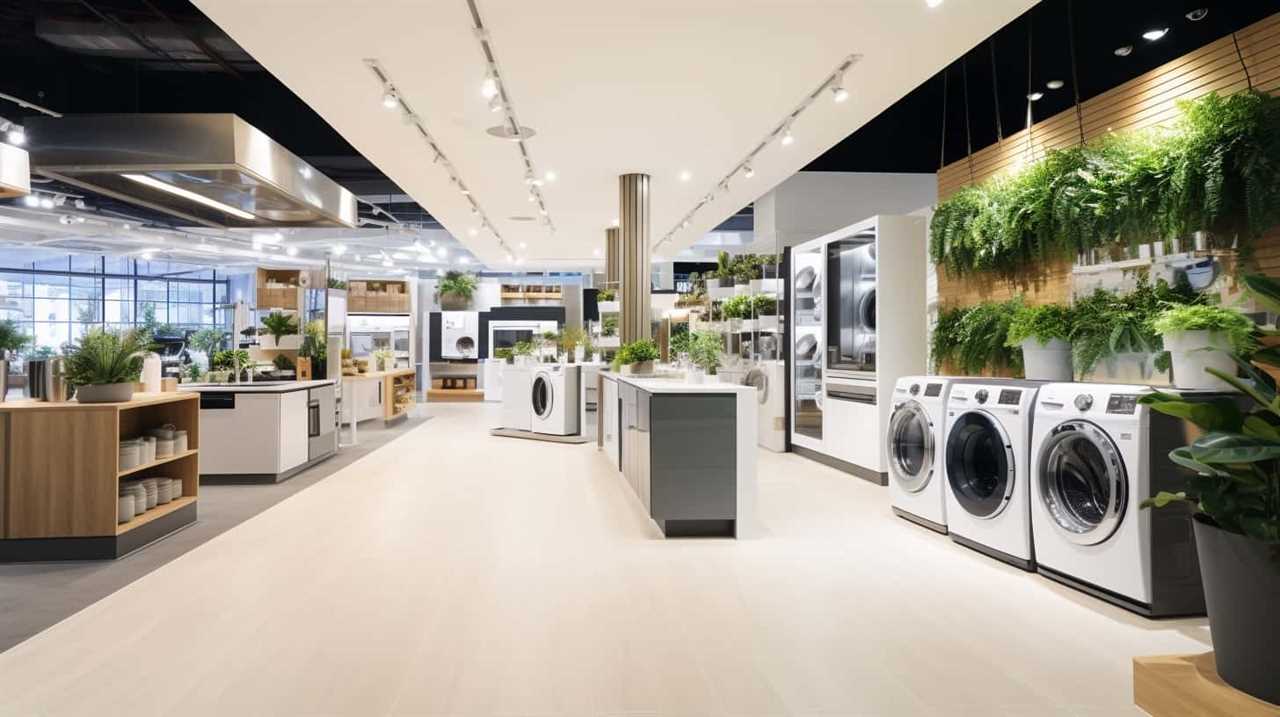
To reduce computer energy consumption, there are several steps we can take. First, we can adjust power settings to put the computer to sleep or hibernate when not in use. Second, we can unplug peripherals and accessories that aren’t needed. Lastly, we can consider upgrading to more energy efficient models when it’s time to replace our computers.
Electric Heaters
Electric heaters are a common household appliance used for heating spaces. However, they can consume a significant amount of electricity, resulting in high energy bills.
To address this issue, it’s important to consider energy-efficient heating alternatives and cost-saving heating solutions that can help reduce electricity consumption and save money in the long run.
Energy-Efficient Heating Alternatives
We can explore energy-efficient heating alternatives by considering the use of electric heaters. When it comes to energy efficient space heaters, there are a few options to consider:

- Ceramic heaters: These heaters use a ceramic element to generate heat. They’re known for their quick heating capabilities and energy efficiency.
- Infrared heaters: These heaters use infrared radiation to heat objects and people directly, rather than heating the air. They’re efficient and provide instant warmth.
- Geothermal heating systems: While not technically electric heaters, geothermal heating systems are an energy-efficient alternative. They use the stable temperature of the ground to heat and cool your home, reducing energy consumption.
Cost-Saving Heating Solutions
To explore cost-saving heating solutions for your home, let’s consider the efficiency and benefits of using electric heaters.
Electric heaters are a cost-effective heating option that provides energy efficient heating alternatives. They convert electrical energy into heat, making them highly efficient and environmentally friendly.
Electric heaters offer precise control over temperature settings and are easy to install and maintain. They come in various types, including radiant heaters, convection heaters, and fan-forced heaters, providing flexibility to suit different heating needs.
Electric heaters are also portable, allowing you to heat specific areas in your home without wasting energy on unused spaces.

With their energy efficiency and affordability, electric heaters are a practical choice for cost-saving heating solutions in your home.
Pool Pumps
How efficiently do pool pumps use electricity?
Energy efficient pool pumps are designed to minimize electricity usage while still effectively circulating water in the pool. Here are some pool maintenance tips to ensure optimal energy efficiency:
- Choose an energy efficient pool pump: Look for pumps that have been certified by ENERGY STAR or other reputable energy efficiency programs.
- Optimize pump run time: Adjust the pump’s run time based on the size of your pool and the desired water circulation. Running the pump for shorter periods at off-peak hours can help save energy.
- Maintain proper water chemistry: Regularly test and balance the pool water to prevent clogging and reduce strain on the pump.
By following these tips, you can maximize the efficiency of your pool pump while ensuring a clean and well-maintained swimming pool.

Now, let’s move on to discussing electric ovens and their electricity consumption.
Electric Ovens
After optimizing the efficiency of our pool pumps, let’s now turn our attention to electric ovens and their electricity consumption. Electric ovens are a common appliance in most households and can consume a significant amount of energy. However, there are energy-efficient oven alternatives available that can help reduce electricity usage. One such alternative is cooking with gas, which generally requires less energy compared to electric ovens. Gas ovens offer precise temperature control and quick heating, making them a popular choice among professional chefs and cooking enthusiasts. By considering energy-efficient oven options and exploring cooking with gas, homeowners can reduce their energy consumption and lower their electricity bills.
| Electric Ovens | Energy Consumption |
|---|---|
| Standard | High |
| Convection | Medium |
| Toaster Oven | Low |
Frequently Asked Questions
How Can I Reduce the Electricity Consumption of My Refrigerator?
To reduce electricity consumption of a refrigerator, we can: 1. Set the temperature to the recommended level. 2. Keep the door closed as much as possible. 3. Clean the coils regularly. 4. Use energy-efficient models.
Are There Any Energy-Efficient Models of Air Conditioners Available in the Market?
There are energy-efficient models of air conditioners available in the market. These smart air conditioners provide energy efficient cooling options, helping us save electricity and reduce our carbon footprint.

What Are Some Energy-Saving Tips for Using Clothes Dryers?
To reduce electricity consumption of clothes dryers, we can follow these energy-saving tips: clean the lint filter regularly, dry full loads, use the moisture sensor setting, and consider air-drying clothes whenever possible.
Is It More Energy-Efficient to Use a Gas or Electric Water Heater?
When comparing gas and electric water heaters, it’s important to consider energy efficiency. Gas water heaters tend to be more energy-efficient than electric ones. Additionally, look for energy-efficient refrigerator models to further reduce electricity consumption.
How Can I Save Energy While Using My Dishwasher?
To save energy while using our dishwasher, we can follow these tips: only run full loads, use the energy-saving mode, and let the dishes air dry. These practices can help reduce electricity consumption.
Conclusion
So there you have it, folks. After all this information about home appliances that consume the most electricity, it’s clear that we should all rush out and buy more of them.

Because who doesn’t want higher electricity bills and a bigger carbon footprint, right? It’s just a small sacrifice for the sake of convenience and comfort.
So go ahead, splurge on that new electric oven or pool pump. Mother Earth won’t mind… or will she?



